
To wrap up 2018 I wanted to share a something I’ve been working on over the past year, my list of top Sci-Fi novels (slash series where applicable).
First off, let me state that this list is a terrible, awful, no good, bad idea. No matter what order I would put these in there will always be someone who disagrees. That’s totally okay, there are parts of this list that I may disagree with myself depending what lenses I’m looking through. There’s so much going on in the science fiction genre that trying to compare and sort by best is like trying to compare apples and oranges. How do you compare ground breaking works that introduced new concepts well ahead of any real world implementation against enjoyable, albeit unimaginative, military sci-fi serials? What about series with four plus novels that dip and rise in quality depending on what’s going on? Or even works elevated beyond written form by fantastic audio book narration? The short answer is you can’t, not realistically at least.
Where a series ranks on this list is largely based on the impact it had on me. How much I loved reading or listening to the work. How much it expanded my viewpoints, how much I emotional impact followed me days, weeks, years later. Each placement is considered at as a whole view of the work and micro placement (eg. above or below another work) can vary depending on what aspect is floating around my head at that specific time.
Secondly, I tried to limit the list to works I’ve gone through recently or have otherwise a strong memory of. The noticeable absence of works such as A Scanner Darkly, and Do Androids Dream of Electric Sheep? are ones I haven’t read in over a decade.
While I would love to add a nice and fulfilling review to each item on the list, I’m just great of a wordsmith. Eventually each item will have a small blurb at the least, and maybe even a quote from someone else who summed up my viewpoint well. For right now, I’m publishing what I have instead of holding things up for another year.
- Initially published Jan 11, 2019.
- Feb 12, 2019 – Added Andromeda Strain and Singularity Trap
- April 9th, 2019 – Added Galaxy’s Edge and Planetside
- August 20th, 2019 – Added The Quantum Magician, The Dark Beyond the Stars, and The Atlantis Gene
- May 2020 – Added Marrow, A Fire Upon the Deep, The Stars are Also Fire, and Friday
- August 19, 2020 – Added Off to Be the Wizard, Revelation Space, and Pushing Ice
- March 26, 2021 – Ethos Effect, Burning Paradise, The Cat Who Walked Through Walls, Thousandth Night, Hull Three Zero, Revenger, House of Suns and Fear the Sky
- July 13, 2024 – Steal the Stars, Project Hail Marry, Salvation Sequence series, Ravenger, Renegade/Drysine Legacy (Spiral Wars series), Downbelow Station, Unification War Trillogy, Micky7, Eversion, Will Save The Galaxy for Food, and more
Special Note – I have a habit of picking up old, used, sci-fi novels simply because I like the cover. Maybe I’ll read a few lines into the synopsis but if it sounds decent enough I’ll buy it, throw it on a shelf, and return to it later without knowing a damn thing about what I’m getting into. Time and time again I’ve found myself pleasantly surprised. Most of my favorite works come from this sort of exploration, or someone making a recommendation and jumping in without bothering to read reviews or any detail about what’s going on. I’ve found that this is, hands down, the best way to read. So, if you see something (on this list or elsewhere) that piques your interest, I highly recommend you give a shot before bothering to look closely at any review or plot details.
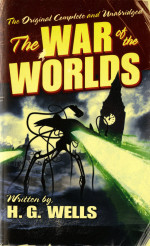 |
#1 War of the Worlds by HG Wells |
|
|---|---|---|
| Not sure what to say that hasn’t been said hundreds of times before about how great and impactful War of the Worlds is. It’s a testament to Wells that over a century later it can still engage and capitalize on societal fears. | ||
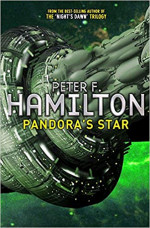 |
#2 The Commonwealth Saga by Peter F HamiltonPandora’s Star and Judas Unchained |
|
| I went into the Commonwealth Saga blind. Didn’t even read the short publishing blurb. And holy shit was it an amazing ride. Despite the fact that there are some glaring issues with the audio book I jumped at two-hour car rides just for a chance to make more progress. The universe is fantastic, the characters great, the way they intertwine throughout the story even better. I could go on and on, but it’s best if you take my enthusiasm and go in blind like I did. | ||
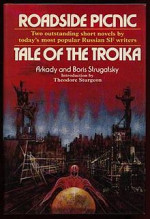 |
#3 Roadside Picnic by Arkady & Boris Strugatsky |
|
| Probably the most creative work of science fiction I have ever read. The simple idea that aliens could visit, leave their trash behind, causing untold and incomprehensible changes? Simply mind blowing. | ||
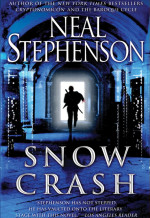 |
#4 Snow Crash by Neal Stephenson |
|
| It’s hard to overstate the perfect mix of creative and entertaining ideas that make up Snow Crash. It’s immersive, entertaining, and groundbreaking. | ||
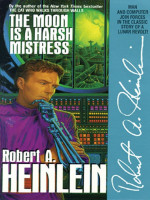 |
#5 The Moon is a Harsh Mistress by Robert A. Heinlein |
|
| I laughed, I cried, I aspired to toss people who don’t return their shopping carts out of an airlock. | ||
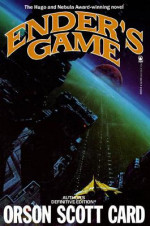 |
#6 The Ender Quintet by Orson Scott CardEnder’s Game, Speaker for the Dead, Xenocide, and Children of the Mind |
|
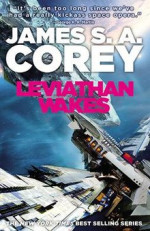 |
#7 The Expanse Series by James S. A. CoreyLeviathan Wakes, Caliban’s War, Abaddon’s Gate, Cibola Burn, Nemesis Games, Babylon’s Ashes, Persepolis Rising & Novellas |
|
| I wasn’t a huge fan of the first novel, the hard boiled detective genre isn’t a favorite a favorite of mine, yet with each subsequent novel I fell deeper and deeper into the series. The characters and interactions are strong, the helopolitical ™ politics realistic, and the crisis thoroughly engaging. It’s a universe that feels open and full of potential while at the same time the characters add a level of comfort and intimacy. Though the series is long, I’m easily sucked into each installment. The short stories outside of the main novels really help add more depth where necessary and the authors have a knack for sentences you want to save for later quoting. | ||
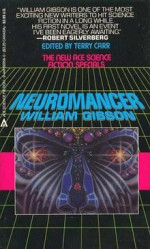 |
#8 Neuromancer by William Gibson |
|
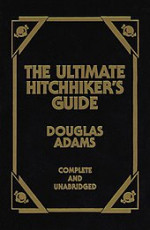 |
#9 The Hitchhiker’s Guide to the Galaxy Series by Douglas AdmansThe Hitchhiker’s Guide to the Galaxy, The Restaurant at the End of the Universe, Life, the Universe and Everything, So Long, and Thanks for All the Fish, and Mostly Harmless |
|
| I’m of the mindset that the first novel is one of the greatest things ever written, and – unfortunately, each subsequent novel decreases in entertaining value as things become more and more depressing. On a side note I really need to re-read And Another Thing… by Eoin Colfer which I remember really enjoying despite the insistence of many HG2G fans. | ||
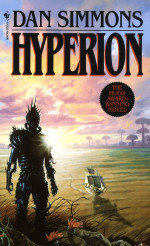 |
#10 Hyperion and Fall of Hyperion by Dan Simmons |
|
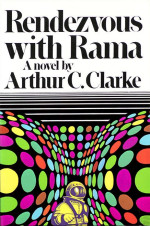 |
#11 Rendezvous with Rama by Arthur C. Clarke |
|
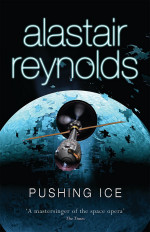 |
#12 Pushing Ice by Alastair Reynolds |
|
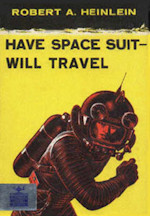 |
#13 Have Spacesuit – Will Travel by Robert A. Heinlein |
|
| An utterly charming and enjoyable read. A simple mix of hard science and 50’s science fiction that both manages to teach and entertain without beating the reader over the head like so many other books of the genre may tend to do. | ||
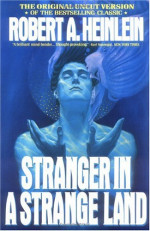 |
#14 Stranger in a Strange Land by Robert A. Heinlein |
|
 |
#15 Dune by Frank Herbert |
|
| The first half of Dune is simply fantastic. Uniquely creative universe, great characters, tons of tension. However the second half, once Paul starts tripping in the desert, takes a hard nose dive. Up until that point anything can happen and you’re sitting in anticipation the whole way. After Paul gets his extraordinary powers the narrative gets on the rails and stays there through the very end. Everything is a foregone conclusion and some of the final revelations/twists are just just poorly dropped in. | ||
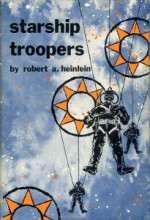 |
#16 Starship Troopers by Robert A. Heinlein |
|
 |
#17 The Final Architecture Series by Adrian TchaikovskyShards of Earth, Eyes of the Void, Lords of Uncreation |
|
 |
#18 Salvation Sequence by Peter F HamiltonSalvation, Salvation Lost, and The Saints of Salvation |
|
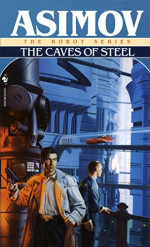 |
#19 The Caves of Steel by Isaac Asimov |
|
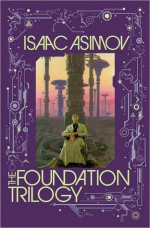 |
#20 The Foundation Trilogy by Isaac Asimov |
|
| I once described Foundation as the novelization of a chess game you already know the outcome to. Not for everyone, but a classic instalment that still remains interesting today. Asimov’s writing is superb and Scott Brick’s narration just as fantastic. | ||
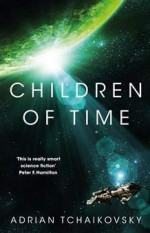 |
#21 Children of Time by Adrian Tchaikovsky |
|
| Probably the best modern “classic sci-fi” novel. There’s a sequel out there, which I may get to at some point. Frankly Children of Time ended so perfectly it’s sad to see it fall victim to the “gotta make a series out of everything” demand. | ||
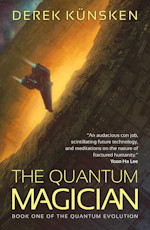 |
#22 The Quantum Evolution by Derek KunskenThe Quantum Magician, The Quantum Garden, and The Quantum War |
|
| At its core, Quantum Magician is a simple heist plot with many of the genre’s tropes, but it’s wrapped in layers of one of the most unique universes in sci-fi. Plenty of concepts that are both out there and surprisingly grounded (with tons of hard detail), leading to a cast of characters you wont find anywhere else. I recommend reading this over the audio book, as narrator T. Ryder Smith brings things to the table that I don’t believe were initially intended/contrast with writing. | ||
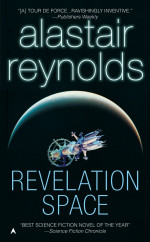 |
#23 Revelation Space by Alastair ReynoldsRevelation Space, Chasim City, Redemption Ark, and Absolution Gap (lumping The Prefect in here as well) |
|
| This was a hard set to rank as there are various highs, lows, and parts that drag out throughout the Revelation Space series. Even through the bad parts, and the rubbish ending, there are some great characters, unique locations, and concepts. | ||
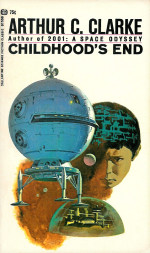 |
#24 Childhood’s End by Arthur C. Clarke |
|
 |
#25 The Kingdom Trilogy by Bethany JacobsThese Burning Stars (plus On Vicious Worlds, and a third unnamed novel, I haven’t read yet) |
|
| As far are the “sci-fi” aspect goes, it’s basically a light schmear, zero depth and some questionable elements, all to support the general plot. The plot however is solid, and the characters are superbly well done. Despite being a part of a trilogy These Burning Stars can be read by itself. | ||
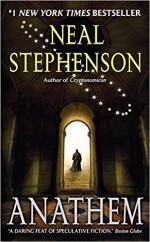 |
#26 Anathem by Neal Stephenson |
|
| The world we’re taken to in Anathem is incredibly dense and a lot of time is spent fleshing things out. It might be too much for many readers, but this kind of world building is Stephenson’s forte. However, if you can get past the hard science and slow pacing you’ll find the leisurely pace quicken and suck you in. | ||
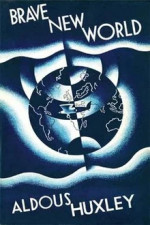 |
#27 Brave New World by Aldous Huxley |
|
| I admit, I think Brave New World is pretty overrated. It’s depiction of a future dystopia sounds a whole lot better than the freedom John seems to desire. But maybe the light that casts on me is exactly what Huxley wanted… | ||
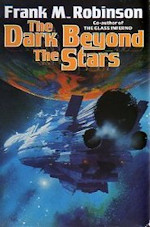 |
#28 The Dark Beyond the Stars by Frank M. Robinson |
|
| A character driven story about folks living in a generational ship that does an solid job building up the characters while slowly building and unveiling mystery. Very little in the way of science or engineering detail, it’s really all about the characters. My favorite aspect is probably the pessimistic view of the galaxy we live in, with just a tad of optimism to keep the light on. | ||
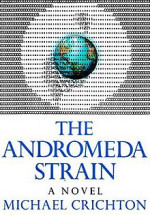 |
#29 Andromeda Strain by Michael Crichton |
|
| If there’s a better hard sci-fi work that deals with biological contagions please let me know. While none of the characters jump off the page, Crichton’s hard look at a germ from space and the 60’s era tech, impact, and general processes, is incredibly compelling. The only negative is that the book just sorts of ends. We’re given a convenient solution, and for all the time spent on detailing the incident response and outcomes, barely any is spent on the larger outcome of the incident. | ||
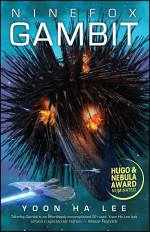 |
#30 Machineries of Empire by Yoon Ha LeeNinefox Gambit, Raven Stratagem, and Revenant Gun |
|
| The first chapter is probably one of the most confusing introductions ever. The technology is so abstract and based and crazy quantum mechanics postulations, that it might help new readers to visit this quick blurb on Reddit for some groundwork. Essentially the technology of the universe is based on the effects of what society perceives as true alongside a lot of math.
That creativeness is only a great backdrop to even better characters. A lot of work goes into building the characters, their motivations, and the universe at large. The end result is characters full of depth who you’re genuinely invested in. It’s a great example of a basic plot elevated by an imaginative setting and superior character development. Oh, and the little bits of mystery (comparatively little exposition) regarding common things in-universe helps too. The third book is largely unnecessary and missing a lot of the exotic (get it?) nature of the first two. There’s some good character stuff, though not necessary to the enjoyment of the first two, and an quite a bit of sexual content used as a story/character crutch. It’s not bad, just generic. |
||
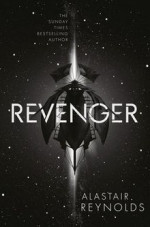 |
#31 Revenger by Alastair Reynolds |
|
| Once again Reynolds flexes his world building skills. Can’t say enough good things about it. The ending is about as close as he gets to actually sticking the landing. There are two other follow up novels to this, and based on the reviews, he doesn’t quite manage the same. | ||
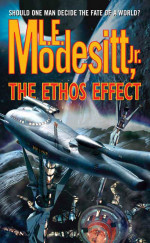 |
#32 Ethos Effect by L.E. Modesitt, Jr |
|
| I went into this blind, only to find out well later that this is a follow up to another novel, The Parafaith War. Thankfully I found no issues going in without any knowledge of the original and think it works quite well that way. Some might find this book bland, lots of detail and politics, characters researching and skimming the news, the sort of thing I imagine most Jack Ryan novels are like. Yet, it has a very unique look at modern day ethical issues but presenting on a galactic scale. It might be a bit hit-you-over-the-head at times but it’s nice to see modern Sci-Fi novels still tackle social issues. | ||
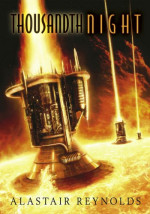 |
#33 Thousandth Night by Alastair Reynolds |
|
| This might be the only short story on this list, and would best be bundled with House of Suns, but that’s a lot lower on this list. Thought it was important to set this up higher. Once again, Reynolds hits a home run with the world building. It’s so far in the future, and the technology so advanced, that you honestly believe almost anything is possible. Probably one of the best expressions of “out there” thought on this list. | ||
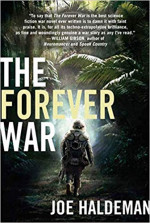 |
#34 The Forever War by Joe Haldeman |
|
 |
#35 Spiral Wars Series by Joel SpephardRenegade, Drysine Legacy, Kantovan Vault, Defiance, Croma Venture, Rando Spicer, Qalea Drop, Ceephay Queen |
|
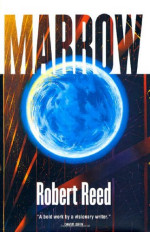 |
#36 Marrow by Robert Reed |
|
| Marrow is one of those novels I went into blind, don’t think I even read the liner notes. As far as I’m aware it’s a completely unique concept that I was excited to discover without forewarning. I’d say more, but you should do the same. 🙂 | ||
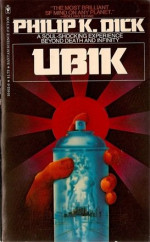 |
#37 Ubik by Philp K. Dick |
|
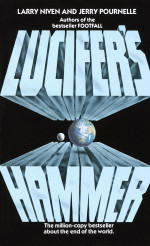 |
#38 Lucifer’s Hammer by Larry Niven and Jerry Pournelle |
|
 |
#39 Jacques McKeown Series by Yahtzee CroshawWill Save the Galaxy for Food, Will Destory the Galaxy for Cash, Will Leave the Galaxy for Good |
|
| Lightweight and entertaining. Perfectly narrated by Yahtzee as well. | ||
 |
#40 The Martian by Andy Weir |
|
| As far as hard sci-fi goes, it doesn’t get more realistic than this. Thoroughly researched The Martian stands apart for it’s complete lack of sci-fi hand waving. It may not have the most depthful characters, or a deep and thoughtful plot, but it’ll be hard not to appreciate the vision that went into this tale of survival. The only real downside is the ending which changed just enough after getting picked up by a proper publisher that it might as well have been written by Neil Stephenson. | ||
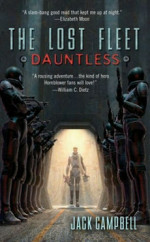 |
#41 The Lost Fleet Series by Jack Campbell |
|
| A bit of a guilty pleasure, the Lost Fleet series doesn’t have an innovative world or super deep characters. It also has a hard time knowing when to wrap up. What it does have is the most realistic take on space combat I’ve read, and it does it with just enough trophy goodness that’s a page turner like no other. Light reading compared to many of the works on the list, sure, but there’s nothing wrong when it’s thoroughly engaging. | ||
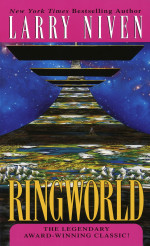 |
#42 Ringworld by Larry Niven |
|
| I also enjoyed The Ringworld Engineers, though Niven’s methodology of bringing back some of the characters from the first novel is indicative of the novel’s creation. | ||
 |
#43 Eversion by Alstair Reynolds |
|
| Listen to the audiobook. Think reading the novel would spoil it. | ||
 |
#44 Project Hail Mary by Andy Weir |
|
| More of what you’d expect from Weir, which may turn off readers looking for something new. One fundamental plot element ruined the whole novel for me though. The best part may be Ray Porter’s amazing audiobook narration. | ||
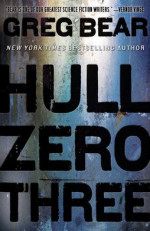 |
#45 Hull Zero Three by Greg Bear |
|
| One of the most unique looks at a colony ship out there. There’s a lot of mystery that’s slowly revealed, but it can be a bit confusing, I had a really hard time parsing the language into a mental vision. | ||
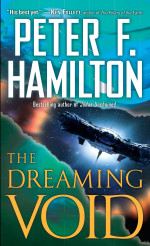 |
#46 The Void Trilogy by Peter F. HamiltonThe Dreaming Void, The Temporal Void, The Evolutionary Void |
|
| I mean, I really loved revisiting the universe from the Commonwealth Saga, and there’s some great stories and characters here (some returning). However there’s two stories being told over the course of the trilogy, and unfortunately that of Edeard, which should’ve been a stand alone series, draws too much away. | ||
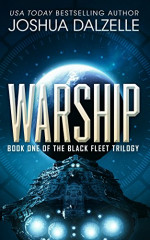 |
#47 The Black Feet Trilogy, The Expansion Wars Trilogy, and the Unification War Trilogy by Joshua DalzelleWarship, Call to Arms, Counterstrike… New Frontiers, Iron & Blood, Destroyer… Battleground, No Quarter, and Empire |
|
| Okay, sue me. I have a soft spot for space battles. While not groundbreaking in any areas, each trilogy is engaging from start to finish. | ||
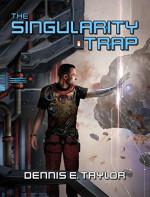 |
#48 The Singularity Trap by Dennis E. Taylor |
|
| Singularity Trap shows a marked progression of Taylor’s innovative sci-fi sense from the Bobiverse trilogy. Okay, one of the characters repeatedly uses the term “noob” in the first chapter or so, but after that it’s a more mature and well rationalized novel. Good character support a strong concept that, while derivative from a few other sources, is combined into a very unique and interesting story. It doesn’t hurt that Ray Porter is back for another great audio book performance. | ||
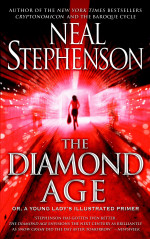 |
#49 The Diamond Age by Neal Stephenson |
|
| Stephenson has a bad reputation of not knowing how to end a novel. Diamond Age is unfortunately the worst example of that. Outside the children’s book, the unique idea of multi-directional packets, and atom level design, that rubbish ending is what sticks with me the most. | ||
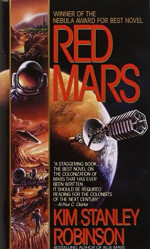 |
#50 Mars Trilogy by Kim Stanely RobinsonRed Mars, Blue Mars, Green Mars |
|
| Okay, I lied a bit, I never got around to reading Green Mars. Red Mars was great, a realistic(ish) look at the colonization of Mars, albeit with a lot of personal melodrama. Blue Mars, I felt, continued with that melodrama but without any new and interesting ideas. I was too bored to really pick up the third novel, despite the strengths of the first. There’s a reason you can always find a used copy of Red Mars, but never a copy of Blue… | ||
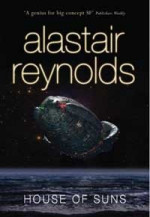 |
#51 House of Suns by Alastair Reynolds |
|
| House of Suns is a rework/revisit to the universe of the short story Thousandth Night – which is a lot higher up on this list. House of Suns wasn’t bad, but compared to the original short story, lacks that whimsy and technical possibility that made Thousandth to memorable. You still visit interesting places, meet interesting places, but it drags and has quite a bit of superfluous detail. Unfortunately it’s another example of Reynolds not quite sticking the landing. | ||
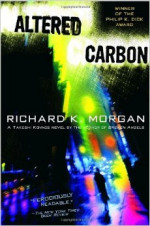 |
#52 The Takeshi Kovacs Trilogy by Richard K. MorganAltered Carbon, Broken Angels and Woken Furies |
|
| These are really three different novels. The first is a cyber punk crime noir, the third is space marines/space aliens, and the third is Point Break in space. It’s probably a lot more of a hit-or-miss series compared to the rest on this list. Give Altered Carbon a shot, if it works for you give Broken Angels a shot. If Broken Angels works for you, give Woken Furies a shot as well. If any along the line aren’t to your taste probably best to look at another author’s work. Oh, and don’t bother with the TV show. | ||
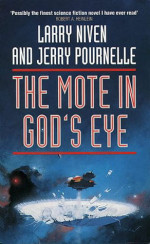 |
#53 Mote in Gods Eye by Larry Niven and Jerry Pournelle |
|
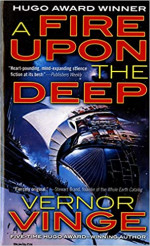 |
#54 A Fire Upon the Deep by Vernor Vinge |
|
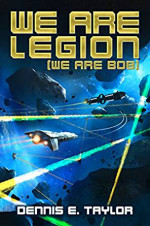 |
#55 The Bobiverse Series by Dennis E. TaylorWe are Legion (We are Bob), For We Are Many, All These Worlds, Heaven’s River |
|
| The first chapter is probably one of the worst I’ve ever read. Thankfully afterward the gratuitous pop culture references are dialed way back and we get a unique perspective on a common sci-fi theme. | ||
 |
#56 Downbelow Station by C. J. Cherryh |
|
 |
#57 Mickey7 by Edward Ashton |
|
| Was super engaged early on in the novel, really liked the core concept. Yet as things went on the plot sort of become predicable and I lost that early excitement. | ||
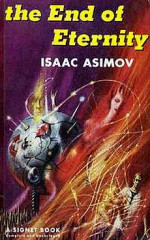 |
#58 End of Eternity by Isaac Asimov |
|
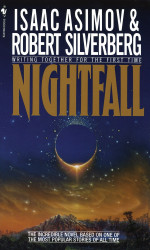 |
#59 Nightfall by Isaac Asimov and Robert Silverberg |
|
| Truly imaginative, Nightfall tells the story of a contemporary society living on a planet where, due to an abundance of suns, only encounters night every few thousand years, and the sort impact that would have. | ||
 |
#60 The Forge of God by Greg Bear |
|
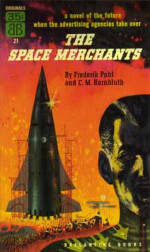 |
#61 The Space Merchants by Pohl Frederik and Cyril M. Kornbluth |
|
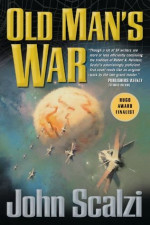 |
#62 Old Man’s War by John Scalzi |
|
| A lot of folks seem to treat Old Man’s War as a one of the most out there and imaginative novels in the genre. In reality it’s hardly discernible from the numerous other military novels in this list. After the transition from an old man it’s by and by a space marine flick. Not bad, but cliched. | ||
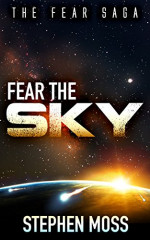 |
#63 Fear the Sky by Stephen Moss |
|
| A different take on the “aliens are invading” genre, certainly better/more rational than Three Body Problem. However I feel duped by the Amazon description. “Years before they enter orbit, their approach will be announced by the flare of a thousand flames in the sky, their ships’ huge engines burning hard to slow them from the vast speeds needed to cross interstellar space.” That sounds fun, a novel where modern day society wakes up one morning to see decelerating ships, time to focus on the societal reaction and how we prepare to such a threat. But that’s not at all what happens. Instead we get a bunch of early visitors looking to soften us up. That’s by no means bad, but I can’t get over what that description might have been. | ||
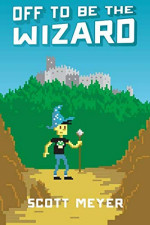 |
#64 Off to Be the Wizard by Scott Meyer |
|
| A short and simple concept with a story that doesn’t outlive its welcome. Great narration performance by Luke Daniels. | ||
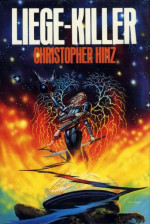 |
#65 Liege-Killer by Christopher Hinz |
|
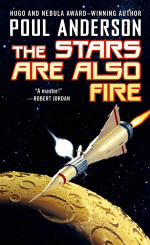 |
#66 The Stars are Also Fire by Poul Anderson |
|
 |
#67 Steal the Stars by Mac Rodgers |
|
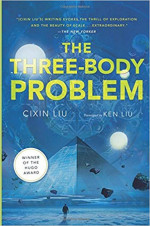 |
#68 The Three Body Problem & The Dark Forest by Liu Cixin |
|
| A bunch of good concepts held together by improbable concepts strung together by the flattest, most nothing characters. It feels like a series of short stories tacked together with no thought about how they work together as a cohesive work. I don’t really see how a third installment can add anything after everything was pretty much wrapped in book two. | ||
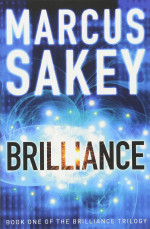 |
#69 The Brilliance Series by Marcus SakeyBrilliance, A Better World, and Written in Fire |
|
| X-Men + FBI Drama = This | ||
 |
#70 A Maze of Stars by John Brunner |
|
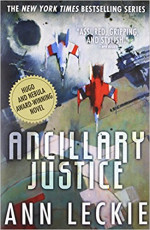 |
#71 Ancillary Justice by Ann Leckie |
|
| What has stuck with me the most is how the main character was unable to tell sexes apart and referred to everyone as “she.” A nifty idea on its own, but you’re talking about a smart ship who can’t differentiate common divisions and learn along the way? It’s hard to visualize your characters when everyone is a single sex by default. As that is what I remember most, more than the situation the ship is in, the person she’s to care for, or anything else, speaks volumes. | ||
 |
#72 The Ouroboros Wave by Jyouji Hayashi |
|
| A mini hard sci-fi space opera, Ouroboros Wave is made of multiple short stories human space society after harnessing the power of a small black hole in the near future. Each story is largely independent of the other, but builds upon the universe and paints a unified picture through different perspectives as time elapses. Some characters make appearances or are mentioned across stories but they’re generally tied together by common organizations and the universe as a whole. The lack of a strong character involvement prevented me from being drawn in personally. I’d recommend for anyone who’s a fan of hard sci-fi. | ||
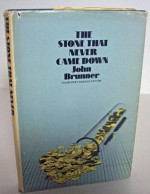 |
#73 The Stone that Never Fell Down by John Brunner |
|
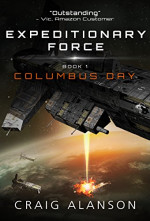 |
#74 The Expeditionary Force Series by Craig Alanson |
|
| This is the prime example of a series uplifted by a fantastic narration. There’s a lot of recycled humor and unnecessary dickishness that would probably grate a lot more if not for R.C. Bray’s audio book reading. However, at the end of the day, the series doesn’t feel like it’s going anywhere. There are hints at something big around the corner, but it’s still to far away for it to show up in any reasonable time without something completely unbelievable happening. That, sadly, is what I expect. A high number of plot elements are deus ex machina – and an even higher amount whatever the opposite of eus ex machina is – where things go bad just because they the story needs to roll on. | ||
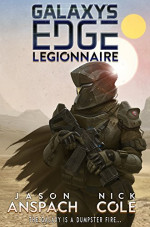 |
#75 Galaxy’s Edge by Jason Anspach, Nick ColeI guess there are more parts but I’ve only read Parts 1 and 2 |
|
| Your generic space Marine military novel, not bad, but largely forgettable. It does a good job laying out the foundation for the universe that is picked up in the second part. Part 2 reads like Star Wars fan fiction. Plucky rouge, side-kick, princess. There’s even a lovable grizzled bounty hunter. Just went you think it might actually get interesting, surprise, it’s the last chapter. | ||
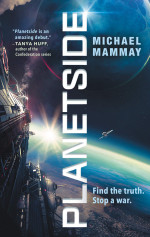 |
#76 Planetside by Michael Mammay |
|
| Your basic military fiction novel, with just enough “it takes place in space and there are some aliens involved” to put it in the sci-fi category. Complete lack of an ending. | ||
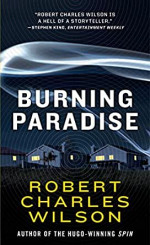 |
#77 Burning Paradise by Robert Charles Wilson |
|
| I didn’t dislike it. Great focus on the characters, in general it’s very dry and boring. | ||
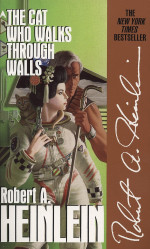 |
#78 The Cat Who Walks Through Walls by Robert A. Heinlein |
|
| Starts off simple enough, oh cool it’s related to The Moon Is A Harsh Mistress, nice. Wait, what’s happening? Why did it become so unnecessarily convoluted? What’s how things end. Ouch. | ||
 |
#79 Into the Unknown by Jasper T. Scott |
|
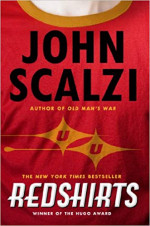 |
#80 Redshirts by John Scalzi |
|
| A good concept tramped thin by being drug out to a full length novel. Once the novelty of the premise dies out the latter half feels by the numbers just scratching for a way to wrap things up | ||
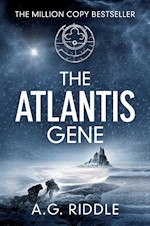 |
#81 The Atlantis Gene by A. G. Riddle |
|
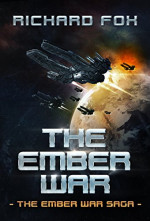 |
#82 The Ember War by Richard FoxThe Ember War and The Ruins of Anthalas… continuing to Blood of Heroes, Earth Defiant, The Guardians of Nibiru, The Battle of the Void, The Siege of Earth, The Crucible, and The Xaros Reckoning |
|
| Not bad, but generic. The end of book two basically sets up conflict indiscernible from filler.. Eric Allen on Goodreads puts it best, “A thoroughly adequate and by the numbers military sci-fi book that doesn’t really bring anything new to the table, stretch any bounds, clear any hurdles, or really do anything that I haven’t read in a dozen and one military sci-fi books I can name just off the top of my head right now. Not bad, just kind of generic.” | ||
 |
#83 The Murderbot Diaries by Martha WellsAll Systems Red, etc. |
|
| Don’t see what everyone else seems to love about this. You’ve got a robot with extreme social anxiety, but that’s not enough to trump over everything else being so basic. | ||
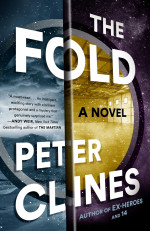 |
#84 The Fold by Peter Clines |
|
| The first chapter basically gives away the entire novel. We then spend the next 80% wading through what’s effective filler until we’re revealed what we already know. At which point, what should be riveting, is anything but. | ||
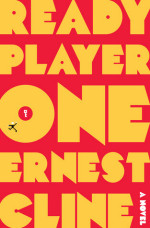 |
#85 Ready Player One by Ernest Cline |
|
| At times RPO is captivating, namely right around the climax to a quest. It’s got that treasure hunt thing going which is hard to deny anyone. Beyond that, so much pop culture filler, pages of literal references, and larges expanses of “can we just move along already?” | ||
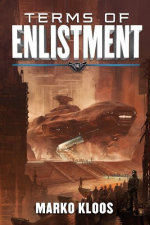 |
#86 Frontline Series by Marcus KloosTerms of Enlistment, Lines of Departure, Angles of Attack, Chains of Command, Fields of Fire, Points of Impact |
|
| Man, this series annoys the crap out of me, in part because of the undue praise it so often receives. Kloos writes a good action sequence, what he doesn’t write well are 2 dimensional characters, engaging story lines, or enemies that are in anyway compelling. Things start off decently enough in the first novel but end up taking a turn down a dead end street toward the end. After which Kloos decides to keep digging a deeper hole, doubling down with what may be the worst alien enemy in this list – by far. It doesn’t help that our characters, despite going through dramatic and life changing events, only point out that they went through this events and that they’ve changed without actually undergoing any sort of substantive development. Combine that with a series that just meanders about – with at least one novel you could take out 2/3 of the story without impacting the rest of the novel, let alone the rest of the over arching story – and you have a series that’s been going nowhere from day one. | ||
 |
#87 USS Hamilton by Mark Wayne McGinnisIronhold Station (and others I likely won’t be reading) |
|
| Clearly I have a soft spot for military sci-fi and stories with engaging space combat, and USS Hamilton fails at everything I like about the subgenre. Characters are flat, uninteresting archetypes. Technology is basically everything thrown at the wall. And any combat surprisingly boring and quick as though intentionally waved away. | ||
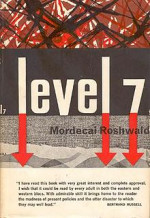 |
#88 Level 7 by Mordecai Roshwald |
|
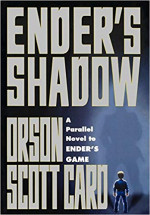 |
#89 Ender’s Shadow Quartet by Orson Scott CardEnder’s Shadow, Shadow of the Hegemon, Shadow Puppets, and Shadow of the Giant |
|
| Frankly, Bean is not a compelling primary character. After the universe expansion that in Speaker for the Dead through Children of the Mind returning to Earth and reading about the relatively inconsequential political environment wasn’t compelling either. I know a lot of people love this series but it just bored me. | ||
 |
#90 Friday by Robert A. Heinlein |
|
| Friday features a fun setting, but practically no plot. The titular character is the textbook definition of a Mary Sue. Friday also highlights some of Heinlein’s questionable sex issues and the odd run on sentence. | ||
 |
#91 Ruins of the Galaxy Series by J.N. Chaney and Christopher HopperRuins of the Galaxy (and others) |
|
| Feels like Star Wars fanfic with an ending so abrupt and devoid of conclusion it’s downright insulting. | ||
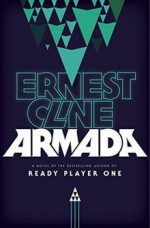 |
#92 Armada by Ernest Cline |
|
| Armada is such a shit show that it made fans of Ready Player One revisit their life choices. So much has already been said, both by me (in part one of the most popular negative reviews on Amazon that they subsequently hid in favor of less popular, more positive ones), and folks like Lastowka & Nelson’s 372 Pages We’ll Never Get Back. | ||
